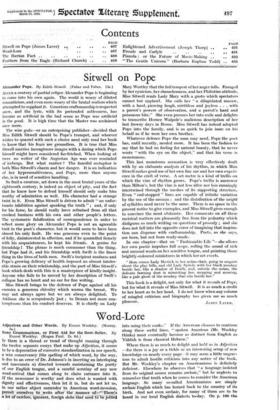Sitwell on Pope
Alexander Pope. By Edith Sitwell. (Faber and Faber. 158.) AFTER a century of partial eclipse Alexander Pope is beginning to come into his own again. The world is weary of diluted romanticism, and even more weary of the brutal realism which attempted to supplant it. 'Conscious craftsmanship is respected anew, and the lyric, with its pretended artlessness, has become as artificial in the bad sense as Pope was artificial in the good. It is high time that the Master was acclaimed
once more. -
The wise gods—lor an enterprising publisher—decided that bliss Edith Sitwell should be Pope's trumpet, and whoever wishes to quarrel with such a choice need only read her book to know that his fears are groundless. It is true that Miss Sitwell marries incongruous images with 'a daring which Pope himself might have considered far-fetched. When looking at trees no writer of the Augustan Age was ever reminded of icebergs. But what matter ? The- fanciful metaphor is both Miss Sitvrell's charm and her danger. It is an indication of her hypersensitiveness, and Pope, more than anyone else, is in need of sensitive handling.
So frail a creature, seldown in the most brutal years of the eighteenth century, is indeed an object of pity, and the fact that he knew how to defend himself should only make him worthy of admiration as well. His character had a strange twist in it. Even Miss Sitwell is driven to admit " an unfor- tunate inhibition against speaking the truth " ; and, if only for his fame, he should really have refrained from all that crooked business with his own and other people's letters. The systematic falsification of correspondence in order to reflect more glory on Alexander Pope is not an agreeable trait in the poet's character, but it would seem to have been almost his only fault. He was generous even to the point of folly, disinterested in affection, and if he quarrelled fiercely With his acquaintances, he kept his friends. A genius for friendship I. The phrase is much commoner than the thing, but' Pope had it, and his friendship with Swift is the finest thing in-the liVesof both men. Swift's incipient Madness and Pope's growing delicacy of health imposed an almost intoler- able strain on their relationship, and the part of-Miss Sitwell's book which deals with this is a masterpiece of kindly insight. Anyone who fails to be moved by her description of Swift's collapse has no heart and no ear for fine writing.
Miss Sitwell brings to the defence of Pope against all his enemies a generous chivalry which warms the breast. We may not always agree but we are always delighted. To Addison she is scrupulously just ; to Dennis not more con- temptuous than his conduct deserves. It is chiefly on Lady Mary Wortley that the full tempest of her anger Mils. Enraged by her cynicism, her shamelessness, and her Philistine attitude, Miss Sitwell rends Lady Mary with a gusto which spectators cannot but applaud. She calls her " a dilapidated macaw,
with a hard, piercing laugh, mirthless and joyless . . . with a parrot's powers of observation, and a parrot's hard and poisonous bite." She even pursues her into exile and delights to transcribe Horace Walpole's malicious description of her last frowzy days in Rome. Miss Sitwell has indeed adopted Pope into the family, and is as quick to join issue on his behalf as if he were her own brother.
Whatever defence Pope the man may need, Pope the poet has, until recently, needed more. It has been the fashion to
say that he had no feeling for natural beauty, that he never
wrote " with the eye on the object," and that his verse is monotonous.
This, last monstrous accusation is very effectively dealt with by an elaborate analysis of his rhythm, in. which Miss Sitwell makes good use of her own fine ear and her own experi- ence in the craft of verse. A set metre is a kind of trellis on which the vine of rhythm grows. Pope's trellis is narrower than Milton's, but the vine is not less alive nor less cunningly
intertwined through the meshes of its supporting structure. Even " end-stopped " lines are capable of infinite variation by the use of the caesura ; and the distribution of the weight
of syllables need never be the same. There is no space in the present notice to give exaMples, and Miss Sitwell gives enough
to convince, the most obdurate. Her comments on all these metrical matters are pleasantly free from the pedantry which disfigures so much writing on questions of prosody ; and she
does not fall into the opposite error of imagining that inspira- tion can dispense with craftsmanship. Poets, as she says, are born, but not born ready-made.
In one chapter—that on " Fashionable Life "—she allows her own poetic impulses full scope, rolling the sound of rich and unusual words on her sensitive tongue, and painting those brightly-coloured miniatures in which her art excels.
" Here comes Lady Hectick in her sedan-chair, going to enquire about the play bills, and old Lady Spitely with her black monkey beside her, like a shadow of Death, and, outside the sedan, the delicate fawning dust is mimicking her, 'mopping and mowing, like a pale ghost of the monkey that site beside her."
This book is a delight, not only for what it reveals of Pope, but for what it reveals of Miss Sitwell. It is as much a credit to her heart as to her head. I do not know when any volume of mingled criticism and biography has given me so much


















































 Previous page
Previous page